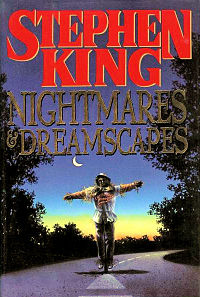
in English and qualified to teach on the high school level. He came to support the anti-war movement on the Orono campus, arriving at his stance from a conservative view that the war in Vietnam was unconstitutional. He was also active in student politics, serving as a member of the Student Senate. From his sophomore year at the University of Maine at Orono, he wrote a weekly column for the school newspaper, THE MAINE CAMPUS.

Stephen attended the grammar school in Durham and Lisbon Falls High School, graduating in 1966. King found work in the kitchens of Pineland, a nearby residential facility for the mentally challenged. After Stephen's grandparents passed away, Mrs. Other family members provided a small house in Durham and financial support. Her parents, Guy and Nellie Pillsbury, had become incapacitated with old age, and Ruth King was persuaded by her sisters to take over the physical care of them. When Stephen was eleven, his mother brought her children back to Durham, Maine, for good. Parts of his childhood were spent in Fort Wayne, Indiana, where his father's family was at the time, and in Stratford, Connecticut. After his father left them when Stephen was two, he and his older brother, David, were raised by his mother. But Stephen King, writing to beat the devil, will do your dreaming for you.Stephen Edwin King was born the second son of Donald and Nellie Ruth Pillsbury King. Fair warning: You will lose a good deal of sleep.

In story after story, several published here for the first time, he will take you to places you've never been before, places that are both dark and vividly illuminated. There's something here for readers of every stripe and predilection-classic tales of the macabre and the monstrous, cutting-edge explorations of the borderlands between good and evil, brilliant pastiches of Chandler and Conan Doyle, even a teleplay and a non-fiction bonus, a heartfelt piece of Little League baseball that first appeared in The New Yorker. The long reach of Stephen King's imagination and the no-holds-barred force of his storytelling have never been so richly demonstrated.

What does it all mean? What else could it mean? First there was Night Shift (1978), then Skeleton Crew (1985), and now Stephen King is back with a third collection of stories-a vast, many-chambered cave of a volume, with passages leading every which way to hell. Meanwhile the legend of Castle Rock returns. Flies settle and die on an old pair of sneakers in New York, and the Nevada desert swallows a Cadillac.


 0 kommentar(er)
0 kommentar(er)
